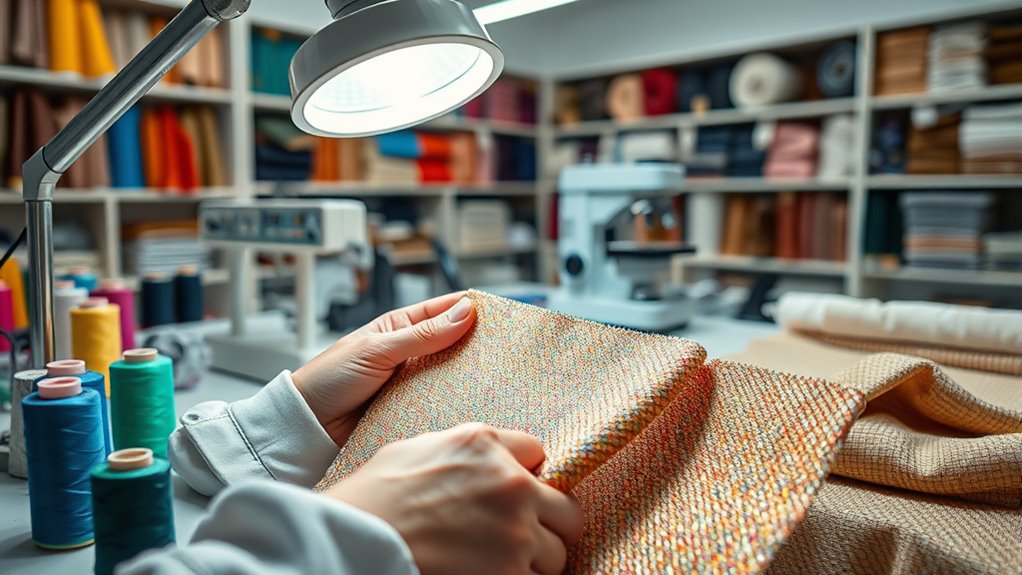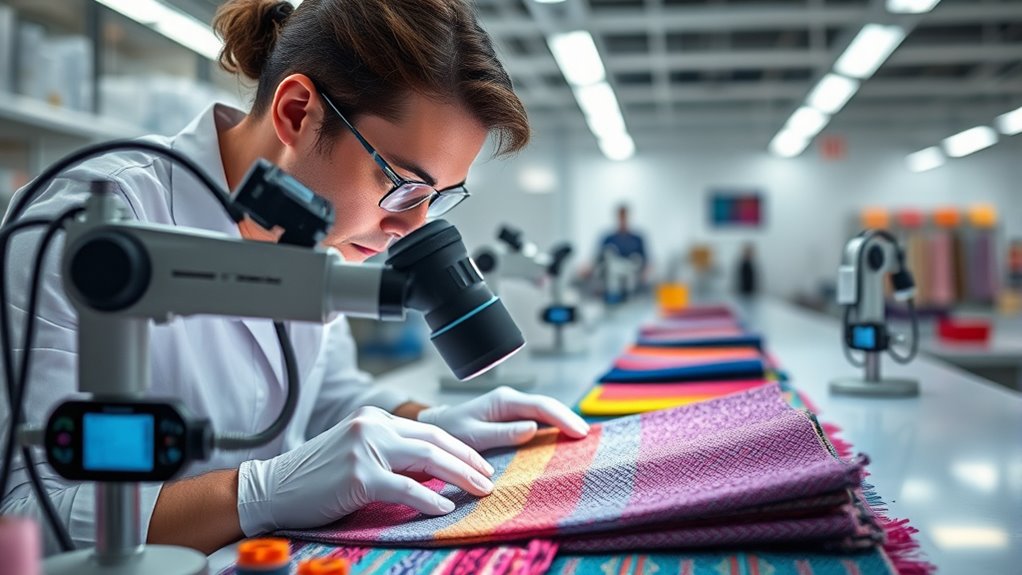A fabric technologist develops and tests fabrics to guarantee they meet performance, durability, and sustainability standards. You’ll evaluate properties like colorfastness, pilling resistance, and moisture-wicking, collaborating with designers and suppliers to improve fabric formulations. You also focus on eco-friendly materials, verifying sustainability claims and incorporating new technology. Your role acts as a bridge between raw materials and finished products, helping brands achieve high-quality, eco-conscious textiles. Keep exploring to discover how this role shapes textile innovation.
Key Takeaways
- Develop and test fabrics to ensure they meet performance, durability, and aesthetic standards.
- Conduct standardized and innovative tests for fabric properties like strength, colorfastness, and breathability.
- Evaluate eco-friendly fabrics for environmental impact and performance, supporting sustainability goals.
- Collaborate with suppliers, designers, and manufacturers to improve fabric quality and incorporate technological advances.
- Translate technical fabric data into actionable insights to meet safety, quality, and sustainability requirements.

A fabric technologist plays a critical role in the development and quality assurance of textile products, ensuring that fabrics meet specific performance and aesthetic standards. You’re at the forefront of testing and refining fabrics, making sure they’re suitable for their intended use. Fabric testing is a core part of your job, as it helps determine properties like durability, colorfastness, pilling resistance, and moisture-wicking abilities. These tests are indispensable to guarantee that the fabrics will hold up over time and perform as expected in real-world conditions. When working with sustainable fabrics, your role becomes even more essential. You evaluate whether eco-friendly materials meet both environmental goals and functional standards, ensuring that sustainable fabrics are not only good for the planet but also reliable for consumers.
Fabric technologists ensure sustainable fabrics meet performance standards, balancing eco-friendliness with durability and quality.
You understand that the textile industry is shifting toward sustainability, and you’re actively involved in sourcing and developing fabrics made from recycled fibers, organic cotton, or plant-based dyes. Your expertise helps brands achieve their sustainability targets without compromising quality. This might involve developing new testing protocols to verify the eco-credentials of sustainable fabrics or collaborating with suppliers to improve their manufacturing processes. Your work guarantees that these fabrics meet rigorous standards, such as ASTM or ISO certifications, which validate their performance and eco-friendliness. Staying updated on fabric technology advancements allows you to incorporate innovative solutions that enhance both sustainability and performance.
In your daily routine, you might perform various tests, from evaluating tensile strength to measuring fabric breathability. You analyze how fabrics respond to washing, exposure to sunlight, or wear and tear, providing essential feedback to designers and manufacturers. By doing so, you help improve fabric formulations or recommend modifications that enhance durability while maintaining softness and aesthetic appeal. Your insights contribute to creating textiles that are not only functional but also visually appealing, aligning with the latest trends and consumer demands.
You also stay informed about advancements in sustainable materials and innovative testing methods. This knowledge allows you to recommend eco-friendly alternatives and validate their claims, giving consumers confidence in the products they purchase. As a fabric technologist, you serve as a bridge between raw material suppliers, manufacturers, and designers, translating technical data into actionable insights. Your work guarantees that fabrics meet safety, quality, and environmental standards, ultimately helping brands build trust with their customers while promoting sustainable practices in the industry. In short, your expertise keeps the textile industry moving forward—innovating, testing, and refining fabrics that are both high-performing and environmentally responsible.
Frequently Asked Questions
What Certifications Are Required to Become a Fabric Technologist?
To become a fabric technologist, you’ll want to obtain relevant textile qualifications and fabric certifications. These credentials demonstrate your expertise in fabric technology, quality control, and textile processes. Certifications like the Textile Institute’s diploma or specific industry-standard fabric certifications can boost your credibility. While formal education often helps, gaining practical experience and pursuing specialized textile qualifications are key steps to advance in this field.
How Do Fabric Technologists Stay Updated on Industry Trends?
You stay updated on industry trends by actively engaging with fabric innovation and textile sustainability developments. You attend industry conferences, participate in workshops, and subscribe to leading journals. Social media and online forums also keep you informed about the latest advancements. Networking with industry peers helps you share insights and stay ahead. This continuous learning guarantees you remain knowledgeable about emerging fabrics, sustainable practices, and innovative technologies shaping the textile industry.
What Software Tools Do Fabric Technologists Commonly Use?
Imagine having a toolbox packed with magic—fabric simulation and color management software are your essentials. You use tools like Adobe Photoshop for color accuracy, CAD programs for fabric designs, and specialized fabric simulation software to test how textiles behave virtually. These tools help you streamline development, troubleshoot issues, and innovate faster. Mastering them makes your work more precise, efficient, and keeps you ahead in the ever-evolving textile industry.
How Does a Fabric Technologist Collaborate With Designers?
You collaborate with designers by sharing your expertise in fabric selection and ensuring the textiles align with their creative vision. You discuss material properties and how they influence design choices, providing technical insights for seamless design integration. Your role involves recommending fabrics that meet aesthetic and functional needs, working closely with designers to troubleshoot any issues and refine the final product, ultimately helping bring their ideas to life with the right textiles.
What Are the Biggest Challenges Faced by Fabric Technologists?
You face significant challenges as a fabric technologist, especially in maintaining fabric quality while meeting sustainability challenges. Balancing durability, comfort, and eco-friendly materials requires constant innovation. You need to stay updated on new technologies and sustainable practices, which can be demanding. Additionally, sourcing sustainable fibers and ensuring consistent quality across production batches adds complexity. These challenges push you to develop solutions that align with both industry standards and environmental responsibility.
Conclusion
As you explore the world of fabric technologists, it’s funny how your passion for textiles can turn into a career that shapes fashion and innovation. Suddenly, those sleepless nights spent testing fibers become your everyday routine, and you realize how small the world is when you find yourself collaborating with designers and engineers. It’s almost like fabric itself weaves your journey together, proving that sometimes, the perfect role was stitched into your path all along.









